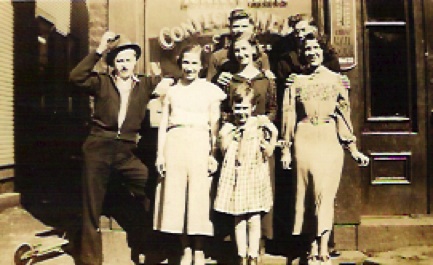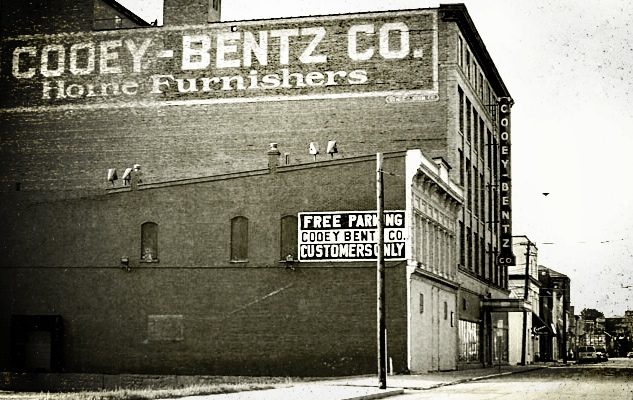By Gerry Griffith
Weelunk Contributor
A word about this series: Like a lot of men, I mentally compartmentalize life and memories. There are boxes up in my head socked away on various imaginary shelves to be pulled down and consulted whenever required. There are boxes for school memories, family memories, college memories, work memories, and information about the very special places in my life. In the box in my brain marked “Wheeling,” there are two distinct collections.
The first holds the recollections of my mother’s Wheeling. I call them “The Mabel Files,” that she told me over my lifetime—a pre-World War II collection of random stories about:
- Her sightless parents, Mr. and Mrs. T.J. Minns, Jr.
- Their little family’s entrepreneurial schemes and struggles to make ends meet in the Wheeling of the early 1900s through the Depression
- The tiny confectionaries they ran all over South and Center Wheeling and the young men (including my father) who “loafed” in them, and
- The war years.
The second collection contains my own distinct memories of the Wheeling of my childhood and youth (Okay, let’s go ahead and call them the “Gerry Files.”). These are stories about the Wheeling where:
- President Kennedy’s motorcade rolled slowly down North Main Street one fall evening in 1962 and my mother crying out to him, “Hi Jack,” as he passed by (leaving the 8-year-old version of me with the mistaken impression that she knew him personally)
- My older brother and his budding young musician pals gathered inside Nick’s Music store downtown on Saturday mornings to try out guitars and talk about the songs of some new guy named Bob Dylan
- I had my first job—selling Shrine Circus tickets in a sweaty cramped little trailer at 12th and Market from which constantly blared poorly recorded circus band music that nearly drove me mad.
My mental file boxes rain down their contents whenever I take a moment to open them: picture Fibber McGee’s closet. I hope weelunk.com is going to help me organize the Wheeling box by allowing me to explore and recount items from both collections. Here’s a starting point in that exercise—an “origins” story from “The Mabel Files,” about my grandparents.

Part 1 From “The Mabel Files”: The Sightless Entrepreneurs of South Wheeling
They were both blind. He was born and raised in Wheeling’s Irish Row. She was born and raised on a farm in Buckhannon, W.Va. They both lost their sight from diseases in childhood, and both went off at a young age to learn at the West Virginia School for the Deaf and Blind in Romney, W.Va., where they met, fell in love, and decided to marry. After their graduation, and subsequent marriage in 1917, Tom and Lizzie Minns “set up housekeeping” as my mother liked to say, back in his hometown of Wheeling.
At Romney, Tom was schooled on how to make two things—brooms and mattresses. But, while he was an expert in making both, Wheeling offered no jobs in those particular pursuits. Meanwhile, Lizzie had become a trained and experienced tutor for young blind people. But Wheeling’s market for those skills was nonexistent. So, with a little financial help from friends, Tom and Lizzie started what would become a series of little neighborhood stores located mostly in South Wheeling.
They were sturdy simple little enterprises that offered penny candy, smokes, soft drinks, the Intelligencer newspaper, and other necessities to a dependable and trustworthy neighborhood clientele. Most of the Victorian era buildings that held the storefronts are gone today. The last one that was pointed out to me as a former store location was on Wood Street just north of Ritchie School. A mobile home now occupies the site. The typical Minns store consisted of a simple storefront with a single-room living quarters either in the back or immediately upstairs. Comfort facilities were almost always outside. The little confectionaries never made much money, but the young couple got by.
Tom was, in my mother’s words, “short, walked with a springy step, and radiated enthusiasm wherever he went.” That enthusiasm and outgoing personality had a way of attracting young people, and before long, they congregated in the store, swapping stories, telling lies, buying products, and just hanging out. My mother would, much later, describe these young men affectionately as “loafers.” She would point to pictures of boys in her high school yearbook and tell me, “He used to loaf at Daddy’s store.” In the good years, Tom sponsored a boys’ neighborhood baseball team. Many of those young “loafers” later became bankers, law enforcement officials, and civic leaders in the Wheeling of the 1940s and 1950s. But in the 1910s and 1920s, even a sighted couple would be challenged to survive. But the Minns of South Wheeling were fearless.
My grandfather encouraged friendships, doled out advice, and mentored the young people, but he kept a tight ship. He was meticulous in organizing and stocking the shelves and display cases in his stores with minimal help from sighted people. With an advanced sense of touch, he could feel denominations of paper money and was able to detect a deception quickly—to the shock and dismay of the few cheaters who tried. More than once he bounded over the counter with startling speed to confront strangers who tried to pass off a dollar bill for a five.

Tom presided over it all and enjoyed keeping customers off guard with a particularly disturbing talent: He had a glass eye that he learned to manipulate with excellent muscle control. Customers weren’t sure if he really was blind when he seemed to be looking them up and down.
Things got complicated for the Minns when the Spanish Flu epidemic hit Wheeling hard in 1918. In 2000, local historian Kate Quinn wrote in an article for the Wheeling Historic Society that by Oct. 6, 1918, “…the Health Department ordered all meetings and amusements discontinued, all schools and churches closed, all funerals and weddings were to be private, use of the street cars should be curtailed, and hospital visits to patients were discontinued. D. M.B. Williams, head of the Health Department further warned the population, ‘Don’t sneeze, cough, or spit, and do not go near crowds.’ The City Council approved the orders.”
Wheeling theater owners were in a tizzy. Some risked arrest for violating the ban against public amusement. The Victoria on Market Street continued plans to run a vaudeville show, the Virginia on 12th Street ran D.W. Griffith’s “The Great Love,” and the Court on Chapline was set to run a musical named “Miss Blue Eyes.”
The Wheeling newspapers advised folks in editorials not to spit on sidewalks, use others’ towels and to “stay away from the sick.” It was further warned that kissing should take place “only when absolutely necessary.” Wheeling City Council ordered that streetcars be sprayed with eucalyptus oil at the end of each day.
When people stopped gathering in public places, Tom’s little store went quiet, and the blind couple became worried but remained strong. The loafers stopped coming and so did the income that came from their purchases. More than once, Tom and Lizzie had to close up shop in one location and move inventory and their few belongings, making trip after trip with a small cart, to another smaller storefront to take advantage of less expensive rents. It was while they were living in one of those smaller shops, just a few doors south of Cooey Bentz Furniture store on Jacob Street, that their one and only child (my mother) was born on Dec. 14, 1919, not long after the flu epidemic subsided. They named her Mabel after one of Lizzie’s favorite sisters. Those few city blocks around Cooey-Bentz would become central to my mother’s life over the next three decades.
There were many more little moves and big stories for my mother and her family: early socializing at Ritchie School; classes at Wheeling High School; courtship by one of the “loafers” at Tom’s store; the Depression years; my mother’s first job at the Ohio County Public Library on Market Street; World War II; and, finally, Mabel’s wartime marriage at Wesley Methodist Church on Jacob Street in South Wheeling.
Each phase featured particular challenges and adventures for the family. The stories that brought those events to life for me were doled out one at a time like a rare wine during talks around our dinner table in the 1960s and 1970s. Tom and Lizzie started it all for my family in a Wheeling that is fading from memory.
Thanks to weelunk.com, I can try to package those memories for posterity, one box at a time. There will be more to come soon from my own stories as well as “the Mabel files.”





